- Home
- Victor Hugo
Les Misérables v. 4/5: The Idyll and the Epic Page 9
Les Misérables v. 4/5: The Idyll and the Epic Read online
Page 9
CHAPTER II.
CRIMES IN EMBRYO INCUBATED IN PRISONS.
Javert's triumph at the Maison Gorbeau had seemed complete, but was notso. In the first place, and that was his chief anxiety. Javert had notbeen able to make a prisoner of the prisoner; the assassinated man whoescapes is more suspicious than the assassin, and it was probable thatthis personage, such a precious capture for the bandits, might be anequally good prize for the authorities. Next, Montparnasse slipped outof Javert's clutches, and he must wait for another opportunity to layhands on that "cursed dandy." Montparnasse, in fact, having met Éponineon the boulevard, keeping watch, went off with her, preferring to playthe Nemorino with the daughter rather than Schinderhannes with thefather, and it was lucky for him that he did so, as he was now free. Asfor Éponine, Javert "nailed" her, but it was a poor consolation, andsent her to join Azelma at the Madelonnettes. Lastly, in the drive fromNo. 50-52 to La Force, one of the chief men arrested, Claquesous, haddisappeared. No one knew how he did it, and the sergeants and agentsdid not at all understand it; he had turned into vapor, slipped throughthe handcuffs, and passed through a crack in the coach; but no onecould say anything except that on reaching the prison there was noClaquesous. There was in this either enchantment or a police trick. HadClaquesous melted away in the darkness like a snow-flake in the water?Was there an unavowed connivance on the part of the agents? Did thisman belong to the double enigma of disorder and order? Had this Sphynxits front paws in crimes, and its hind paws in the police? Javert didnot accept these combinations, and struggled against such compromises;but his squad contained other inspectors besides himself, and thoughhis subordinates, perhaps more thoroughly initiated in the secrets ofthe Préfecture, and Claquesous was such a villain that he might be avery excellent agent. To be on such intimate juggling relations withthe night is excellent for plunder and admirable for the police, andthere are double-edged rogues of the sort. However this might be,Claquesous was lost and could not be found, and Javert seemed moreirritated than surprised. As for Marius, "that scrub of a lawyer whowas probably frightened," and whose name he had forgotten, Javert didnot trouble himself much about him, and besides, a lawyer can always befound. But, was he only a lawyer?
The examination began, and the magistrate thought it advisable notto put one of the members of the Patron Minette band in solitaryconfinement, as it was hoped he might chatter. This was Brujon,the hairy man of the Rue du Petit Banquier; he was turned into theCharlemagne Court, and the eyes of the spies were kept upon him.This name of Brujon is one of the recollections of La Force. In thehideous yard called the Bâtiment Neuf,--which the governor named theCourt of St. Bernard, and the robbers christened the Lion's Den,--andon the wall covered with scars and leprosy, that rose on the left tothe height of the roof, and close to a rusty old iron gate which ledto the old chapel of the ducal house of La Force, converted into asleeping-ward for prisoners, there might have been seen, twelve yearsago, a species of Bastille, clumsily engraved with a nail in the stone,and beneath it this signature,--
BRUJON, 1811.
The Brujon of 1811 was the father of the Brujon of 1832. The latter,of whom we could only catch a glimpse in the Gorbeau trap, was a verycrafty and artful young fellow, with a downcast and plaintive air. Itwas in consequence of this air that the magistrate turned him loose,believing him more useful in the Charlemagne yard than in a secretcell. Robbers do not interrupt their labors because they are in thehands of justice, and do not trouble themselves about such a trifle.Being in prison for one crime does not prevent another being commenced.There are artists who have a picture in the Exhibition, but for allthat work at a new one in their studio. Brujon seemed stupefied byprison; he might be seen standing for hours in the yard near thecanteen man's stall, contemplating like an idiot the mean tariff ofprices of the canteen which began with "garlic, fifty-two centimes,"and ended with "cigar, five centimes." Or else he passed his time intrembling, shaking his teeth, declaring he had the fever, and inquiringwhether one of the twenty-six beds in the Infirmary were vacant.
All at once, toward the second half of February, 1832, it wasdiscovered that Brujon, the sleepy-looking man, had had three messagesdelivered, not in his own name, but in those of his comrades, by theprison porters. These messages had cost him fifty sous altogether,an exorbitant sum, which attracted the sergeant's attention. Aftermaking inquiries and consulting the tariff of messages hung up in theprisoners' visiting room, this authority found out that the fiftysous were thus divided,--one message to the Panthéon, ten sous; oneto Val de Grâce, fifteen sous; and one to the Barrière de Grenelle,twenty-five sous, the latter being the dearest in the whole list. Nowat these very places resided these very dangerous prowlers at thebarrière, Kruideniers _alias_ Bizarro, Glorious an ex-convict, andStop-the-coach, and the attention of the police was directed to thesethrough this incident. It was assumed that these men belonged to PatronMinette, of which band two chiefs, Babet and Gueulemer, were locked up.It was supposed that Brujon's messages, which were not delivered at thehouses, but to persons waiting in the street, contained informationabout some meditated crime. The three ruffians were arrested, and thepolice believed they had scented some machination of Brujon's.
A week after these measures had been taken, a night watchman who wasinspecting the ground-floor sleeping ward of the Bâtiment Neuf, wasjust placing his chestnut in the box (this was the method employedto make sure that the watchmen did their duty properly; every hour achestnut must be dropped into all the boxes nailed on the doors ofthe sleeping wards), when he saw through the peep-hole Brujon sittingup in bed and writing something. The watchman went in, Brujon wasplaced in solitary confinement for a month, but what he had writtencould not be found. Hence the police were just as wise as before. Onething is certain, that on the next day a "postilion" was thrown fromCharlemagne into the Lion's Den over the five-storied building thatseparated the two yards. Prisoners give the name of "postilion" to aball of artistically moulded bread, which is sent to "Ireland," thatis to say, thrown from one yard into another. This ball falls intothe yard, the man who picks it up opens it and finds in it a noteaddressed to some prisoner in the yard. If it be a prisoner who findsthe note he delivers it to the right address; if it be a guard, or oneof those secretly-bought prisoners, called "sheep" in prisons, and"foxes" at the galleys, the note is carried to the wicket and deliveredto the police. This time the postilion reached its address, althoughthe man for whom it was intended was at the time in a separate cell.This person was no other than Babet, one of the four heads of PatronMinette. It contained a rolled-up paper, on which only two lines werewritten.
"Babet, there's a job to be done in the Rue Plumet, a gate opening onthe garden."
It was what Brujon had written during the night. In spite of maleand female searchers, Babet contrived to send the note from La Forceto the Salpêtrière to a "lady friend" of his locked up there. She inher turn handed the note to a girl she knew, of the name of Magnon,whom the police were actively seeking, but had not yet arrested. ThisMagnon, of whose name the reader has already caught a glimpse, wasclosely connected with the Thénardiers, as we shall show presently,and by going to see Éponine was able to serve as a bridge between theSalpêtrière and the Madelonnettes. At this very period Éponine andAzelma were discharged for want of evidence, and when Éponine went out,Magnon, who was watching for her at the gate of the Madelonnettes,handed her the note from Brujon to Babet, with instructions to lookinto the affair. Éponine went to the Rue Plumet, recognized the gratingand the garden, observed the house, watched for some days, and thencarried to Magnon a biscuit, which the latter sent to Babet's mistressat the Salpêtrière. A biscuit, in the dark language of prisons, means,"Nothing to be done."
In less than a week from this, Babet and Brujon happened to meet, asone was going before the magistrate, the other returning. "Well,"Brujon asked, "the Rue P.?" "Biscuit," Babet answered. Thus thefœtus of crime engendered by Brujon at La Force became abortive;but this abortion had
consequences, for all that, perfectly foreign toBrujon's plans, as will be seen. In fancying we are tying one thread weoften tie another.

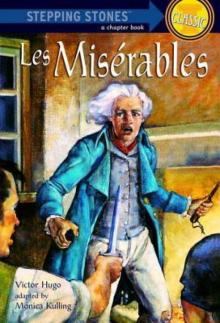 Les Miserables
Les Miserables The Hunchback of Notre-Dame
The Hunchback of Notre-Dame The Man Who Laughs
The Man Who Laughs The Last Day of a Condemned Man
The Last Day of a Condemned Man The Toilers of the Sea
The Toilers of the Sea Waterloo
Waterloo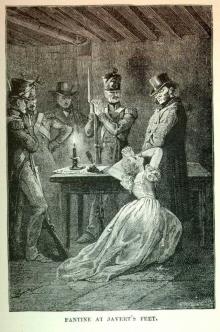 Les Misérables, v. 1/5: Fantine
Les Misérables, v. 1/5: Fantine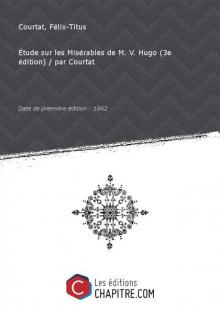 Les Misérables, v. 3/5: Marius
Les Misérables, v. 3/5: Marius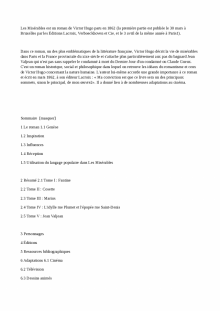 Les Misérables, v. 2/5: Cosette
Les Misérables, v. 2/5: Cosette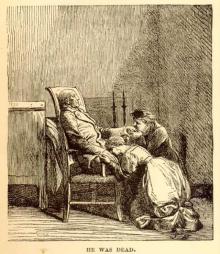 Les Misérables, v. 5/5: Jean Valjean
Les Misérables, v. 5/5: Jean Valjean Hunchback of Notre Dame (Barnes & Noble Classics Series)
Hunchback of Notre Dame (Barnes & Noble Classics Series) Les Miserables (abridged) (Barnes & Noble Classics Series)
Les Miserables (abridged) (Barnes & Noble Classics Series)